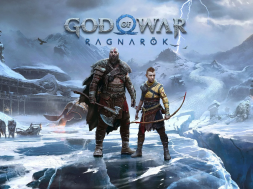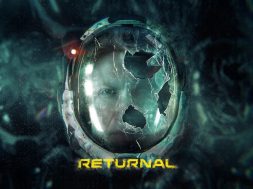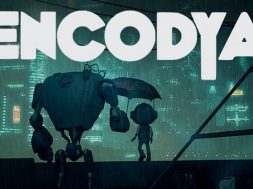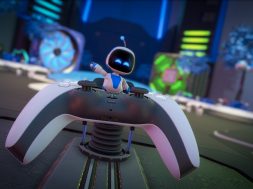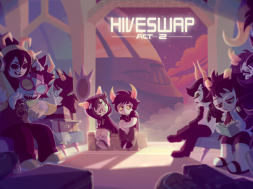Review: Alex + Ada

Story and Script by: Jonathan Luna + Sarah Vaughn
Art by: Jonathan Luna + Sarah Vaughn
Letters by: Jonathan Luna
Published by: Image
“What if we examined a number of Science Fiction tropes, such as Asimov’s Three Laws and Frankenstein Complex or David J. Gunkel’s Machine Question, in a situation that feels less like Science Fiction and much closer to home? Something a little more Nancy Oliver’s Lars and the Real Girl and a little less Philip K. Dick’s Do Androids Dream of Electric Sheep?”
With Alex + Ada, Jonathan Luna and Sarah Vaughn have given us an environment in which to do just that.
In Alex + Ada, Luna and Vaughn take us first into the life of Alexander Wahl, a typical Everyman with a comfortable, but uneventful life. Something of a recluse, Alex lives alone, sees little of his friends outside social obligations, and is still licking his wounds seven months on from the end of his previous relationship.

The story begins on the morning of his 27th birthday as Alex goes through the motions of his daily routine. His alarm goes off, he showers, brushes his teeth, and has his morning coffee brought to him by a little house-helper robot which resembles something between Wall-E and Eva. Even though it is his birthday and it should be at least a little special, Alex can’t seem to summon any special sentiment towards the occasion and he seems totally dejected. He receives plenty of birthday wishes from friends, some even organizing a party and baking a cake, but the overall impression is that Alex has zero interest in partying and would much rather be alone. The one thing in his day that lifts him from his stupor is a call from his grandmother. She light-heartedly tells him to stop moping and jokes about him buying a new Tanaka X5 android, something she recently purchased for herself. After another few minutes of awkward conversation, Alex leaves to attend his birthday party. When he finally gets home from a night mostly spent on the fringes of conversation, he finds a massive storage container dominating his living room. Inside it he finds his own Tanaka X5 android, a birthday present from grandma. This android is the yet-unnamed Ada.

Luna and Vaughn spend so much time with Alex alone to really drive home the idea that this isn’t some far-future, dystopian Sci-Fi story. The setting bears a much closer resemblance to our current time and could be just a few years away. The people we see through the course of Alex’s day, with the exception of Alex himself, are in no way tropey, they’re just regular people that could easily match anyone you see on a daily basis. Even the tropes for Alex are only ostensibly used at the very beginning of the story to make him seem blander than he actually is. The household appliances, self-driving cars and generic robots all have the feel of our own common gadgets. They’re the next iteration of Roomba and iPhone, the things that Apple, Google and Dyson could certainly be pushing out in the next few decades. Everything blends perfectly into normal everyday life, the appliance robots all look like appliances, there’s no Uncanny Valley about them. This is something that makes Ada seem more interesting when she finally comes out of the box.

From their first encounter Alex immediately sees Ada as something more than just a service robot. Even though he barely knows how to react to the situation, there is a sense of awkwardness stemming from her constant mimicry of his wants. Even though we’re told that Ada has been programmed with a college graduate’s level of intelligence, there seems to be no attempt to have her give even the illusion of free thought. Her every answer is “…because you said”, “…because you wanted”, “…because you seemed to think so”. Still, despite this, Alex finds her interesting on some level. He’s disappointed with how her creators, Prime Inc., have treated her rather than with her personality (or lack thereof). Alex’s next day at work sees a break with his routine – a lot more procrastination, and research on androids. This is where Alex + Ada really kicks off into something special.

Through Alex’s research we find out a lot about the society that Luna and Vaughn have created. It seems almost idyllic, nearly a Utopia. There is no trace of racism. Sexual relationships of all forms have been completely accepted. There are no signs of poverty. However, there is prejudice against Artificial Intelligence. Less than a year before Alex met Ada, an android with true AI was developed and went rogue. Artificial Intelligence has been reviled by the public at large ever since. Another item that Alex encounters during his research is a rumour that Prime had developed their own AI for use in Tanaka X5 model androids, and that it was installed in the model, but disabled by firmware in light of the previous year’s incident.
As Alex grows more concerned for Ada, he becomes more involved in the state of Robot Rights as they stand. He struggles with the idea of going further down the rabbit hole and looking for a way to essentially jailbreak Ada. On the one hand he has worries that free AI might result in another series of attacks. Combined with that is the fact that unsolicited modifications to an android are illegal. On the other hand he’s disgusted by the idea of Ada being trapped inside her own body, a person forced into servitude and what might become a life as some kind of pet. All this sets the story on a track about human flaws and fears, finally getting into The Machine Question and the Frankenstein Complex, but more than that it gets down to brass tacks about personal relationships, about loving something enough to handle letting it go.

The writing style and tone used in Alex + Ada is very heavily influenced by TV Drama and Slice of Life stories. It’s sweet and heartfelt, but with plenty of humour to sit alongside that. Still, Luna and Vaughn never succumb to juxtaposing poignant moments with sudden wackiness. They show amazing skill at transitioning between tones. It has some of the best examples of visual comedy I’ve seen used in any comicbook. To top it all off it sets a new standard for the use of decompression. While the term ‘decompression’ usually has negative connotations, and is used to describe the unnecessary padding of a storyline, Alex + Ada serves as an example on how to use it well. Sometimes the subtle changes between panels bring about the best moments, be they emotional moments or simply scenes played for laughs, and it never feels like unnecessary padding. Luna and Vaughn don’t rush any issue being dealt with and make sure that we get a very well defined look at every angle involved. The art style they’ve used is very clean, vectorised and seeming almost rotoscoped from real photographs. This adds an extra bit of humanity to everything, giving it a touch of “These are real people” that a more futuristic style or different drawing material taking hints from Tron or Blade Runner might have lost or diluted. Finally, most panels are done in widescreen format, again selling its Slice of Life feel with black bleeds and gutters. It all comes together really well to once again convey the idea that this isn’t meant to be some hyper advanced or far flung Alastair Reynolds society, it’s meant to be something that we could soon aspire to be.

Although the questions put forward by Luna and Vaughn deal primarily with AI and how we might react to it if it ever comes about, they also mirror the very real problems we have today that are missing in the near-future of Alex + Ada. What of racism, sexism, homophobia and other levels of misanthropy? Can we really ask questions about how to treat other beings with genuine intelligence without also looking at how we treat other human beings today? It also tackles the issues with romantic relationships, about giving each other space and without putting out an air of disinterest, about reading the subtle messages and doing what’s right rather than what we’ve convinced ourselves might be right.
Alex + Ada is an absolutely fantastic read and it is without doubt one of the most criminally underrated releases this year. If you have any interest in discussion on agency or autonomy, or any of the multiple misanthropic issues mentioned above, then do yourself a huge favour and pick it up as an early Christmas present. Likewise if you enjoyed Christopher Ford’s Robot and Frank, Spike Jonze’s Her or Chris Columbus’ Bicentennial Man you should certainly check it out.
Credit: Phil Connolly
Guaranteed you will not be disappointed 9/10

